Featured
How Maldivian tourism can survive Covid-19

By Sonu Shivdasani
The Maldives appears to have dodged a bullet. With just 19 cases of the novel coronavirus at the time of writing (with 13 people having already made a full recovery), the country is in an enviable position. As the United States and Europe groan under the strain of major outbreaks, with tens of thousands of deaths, the Maldives looks forward to completely eradicating the virus within a few weeks.
In some respects, the Maldives is lucky. The archipelago straddles the equator, where temperatures rarely dip below the high 20s. We know the virus doesn’t like heat, and it’s notable that the only major contagions have occurred in cold countries, during winter. The Maldives’ unique geography also lends itself towards containment: The government can, and has, rapidly shut down islands and resorts when a suspected case has emerged. If people test negative, the island is immediately reopened. If someone tests positive, the entire island is placed under quarantine to prevent a spread across the country.
But luck has only been the half of it. When other world leaders wasted precious weeks dithering, questioning the science, or dismissing the coronavirus as a hoax, the Solih administration got to work to protect the country: suspending flight routes, conducting widespread testing (the highest per capita testing in South Asia), and eventually closing the border completely. In a country wholly dependent on foreign tourism, the Government’s willingness to act decisively, in spite of the huge economic cost, almost certainly saved lives.
During the pandemic, the government also found its voice. The daily televised briefings by Mabrook Azeez, an undersecretary at the President’s Office, have been clear, consistent and comforting. The contrast with President Trump’s erratic and misleading press conferences couldn’t be starker.
But the question remains: if the Maldives is soon to be virus free, and contemplating reopening its borders, how best to do it? The last thing the country needs is a flood of infected tourists descending upon Hulhulé, forcing another costly shut down.
A good place to start might be with the super-rich. Beginning the process of opening up by allowing private jets to land has a number of advantages: there are few passengers onboard, who can be immediately isolated in the airport’s VIP lounge and tested for the virus upon arrival. If they test negative, they can go on their way. If they test positive, they can proceed to one of the resorts that have been converted into (arguably the world’s nicest) quarantine and isolation centres. Key to this will be rapid testing kits, that can deliver a result in minutes rather than days.
High end clients spend large sums of money compared to other tourists, so even allowing in a few private jets generates considerable revenues. Soneva has received around 20 enquiries from people who would like to travel to the Maldives by private jet. They intend to stay in our resorts for upwards of a month, to escape lockdowns back home. Although they amount to less than a couple of hundred people, these guests will likely spend around $5 million in total, generating some $600,000 in GST for the government.
Looking further ahead, the Maldives will need to start reopening commercial air routes. But testing a handful of private jet passengers at the airport is one thing, testing hundreds of people descending an A350 is quite another. The Maldives will probably begin opening direct flights to other coronavirus-free countries. China looks like a good bet, having all but wiped out the virus. It also has the advantage of being the Maldives’ biggest tourism market, with a number of existing direct flight routes, operated by Maldivian or Chinese carriers, between the two countries. At the moment, however, all Chinese tourists returning from abroad have to spend 14 days in quarantine in China – not a particularly attractive prospect for would-be tourists. The Maldivian government will have to work with its Chinese counterpart on a bilateral agreement, that allows Chinese tourists returning home from the Maldives to avoid quarantine.
Similar arrangements will have to be made with other countries. It might help to categorise them: “A” group countries could be those, like the Maldives, that have completely eradicated the virus. There is no reason not to operate direct, commercial flights between such destinations. “B” group countries might be those with very few remaining active cases — the Maldives might allow flights to and from such countries, but with added precautions. Then there are the “C” group countries with high numbers of cases — where the Maldives should keep in place travel restrictions.
The Maldives has avoided a coronavirus outbreak, although the economic price has been severe. In order to avoid the collapse of its tourism industry, however, the country must now plan to re-open. If the government approaches this challenge with the maturity and competence with which it has handled the crisis thus far, the Maldives may be spared much of the economic, as well as the human, pain of this pandemic.
Editor’s Note: This op-ed was originally published on Linkedin by Sonu Shivdasani. Sonu is the founder and CEO of Soneva, which owns luxury resorts Soneva Fushi and Soneva Jani in the Maldives, and Soneva Kiri in Thailand.
Cooking
Patina Maldives hosts Chef Shannon Bennett for exclusive April residency

From 1 to 5 April 2026, Patina Maldives, Fari Islands will host Shannon Bennett, one of Australia’s most recognised culinary figures and the creative force behind Belongil. The residency brings together a chef known for shaping dining as an emotional and reflective experience with a destination defined by perspective, creativity and purpose.
Bennett’s career extends beyond traditional notions of cooking. Through projects such as Vue de Monde and Belongil, he has explored dining as a medium for memory, connection and emotion, placing emphasis on experience rather than consumption. His approach centres on creating moments that remain with guests long after the meal has ended.
At Patina Maldives, the residency represents a convergence of shared values. Over five nights, guests are invited to take part in a limited series of dining experiences shaped by intention, curiosity and a sense of place. Rather than recreating Belongil in another setting, the programme evolves its philosophy, drawing inspiration from the natural rhythm and clarity of the Maldivian environment.
Commenting on the collaboration, Bennett said Belongil was conceived as more than a place to eat, but as a space for ideas, connection and lasting moments. He noted that Patina Maldives reflects a similar sense of purpose, adding that bringing his work into the island setting offered an opportunity to create experiences that feel grounded, honest and meaningful.
Patina Maldives continues to develop its identity by providing a platform for global creative voices to shape new conversations and perspectives. The residency with Bennett aligns with this approach, positioning cuisine as one element within a broader cultural and experiential narrative.
Tom Bray, Director of Lifestyle at Patina Maldives, said the resort exists to bring people closer to ideas, creativity and self-discovery. He added that welcoming Bennett reflects this philosophy, describing the residency as an experience designed to shift perspective rather than focus solely on gastronomy.
The residency is presented as an experience defined by intention rather than spectacle. Taking place over five nights on a single island, it brings together Patina Maldives and one of the culinary world’s most reflective minds for a programme shaped by presence, purpose and a sense of moment that cannot be replicated in the same way again.
Featured
You & Me Maldives unveils curated Premium All Inclusive programme
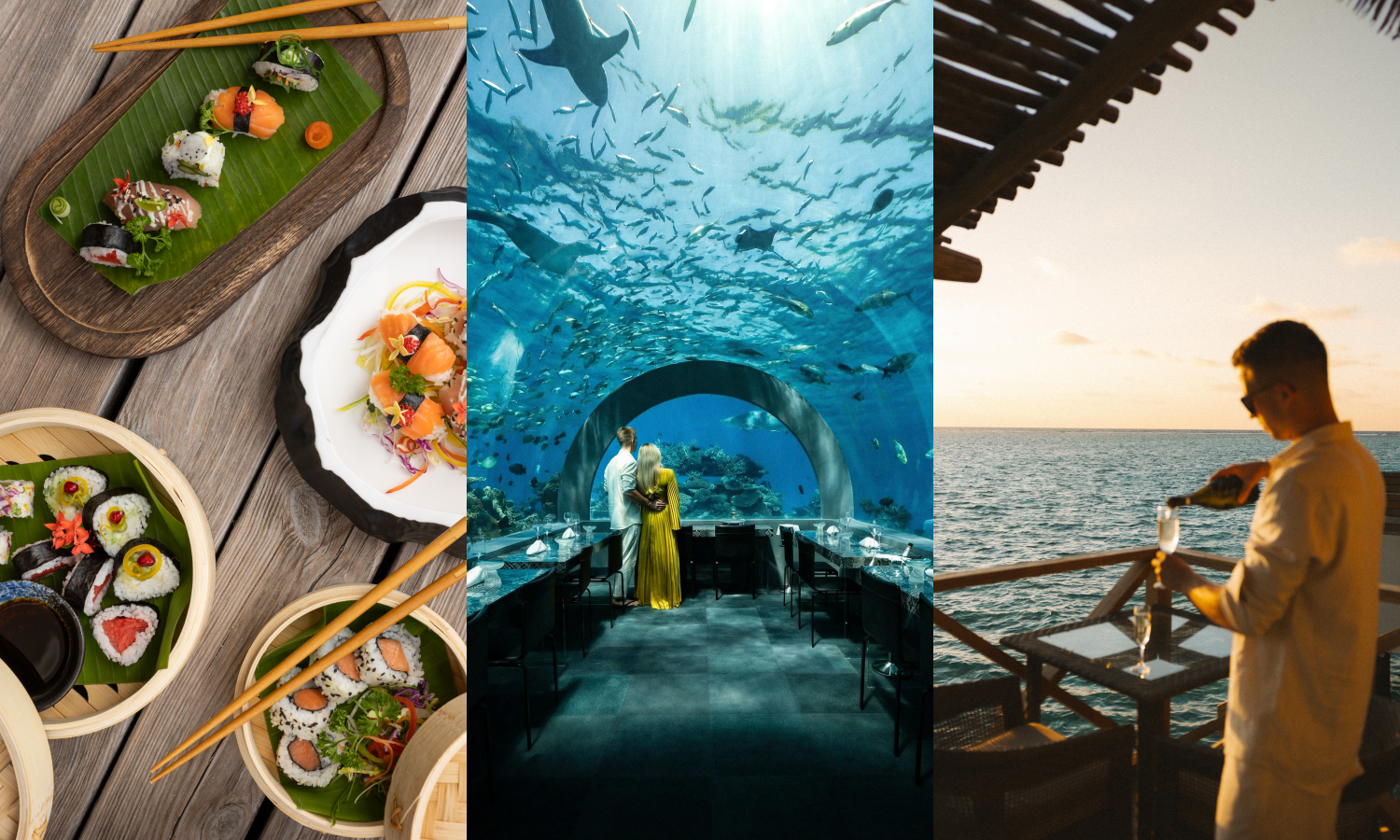
You & Me Maldives, the adults-only luxury retreat under The Cocoon Collection, has announced the launch of its new Premium All Inclusive experience, aimed at enhancing island stays through a more seamless and comprehensive offering in the Indian Ocean.
The Premium All Inclusive experience is designed to begin from the point of arrival. Guests receive complimentary access to The Cocoon Collection Lounge at the seaplane terminal at Velana International Airport, where services are provided to ensure a smooth transition before the journey to the resort.
On arrival at the island, guests are welcomed in their villas with a chilled bottle of sparkling wine and a selection of canapés. The Premium All Inclusive plan includes unlimited premium beverages by the glass, featuring a curated range of wines, signature cocktails, top-shelf spirits, international beers and non-alcoholic options. The in-villa minibar is replenished daily with soft drinks, international beers, red and white wines, as well as assorted snacks. For stays of five nights or more, guests also receive two bottles of premium liquor from a selected list, provided once during the stay.
The experience further includes a range of activities. Guests staying a minimum of three nights are offered one sunset cruise and one snorkelling excursion per stay, while those staying seven nights or more are entitled to a catamaran cruise. Unlimited use of snorkelling equipment and non-motorised water sports, including canoeing, kayaking and paddle boarding, is also included, subject to weather conditions.
Dining forms a central part of the Premium All Inclusive concept. Guests can enjoy three themed dining evenings, including a seafood barbecue under the stars featuring prawns, lobster and oysters. For stays of five nights or more, guests may also take part in a complimentary group cooking class, with a choice between ethnic or Italian cuisine, led by the resort’s culinary team.
Wellness offerings are also incorporated into the programme, with guests able to participate in up to three complimentary sunrise yoga sessions per stay, subject to availability.
The introduction of the Premium All Inclusive experience reflects the resort’s focus on personalised service and carefully curated stays. The offering is positioned to appeal to couples seeking relaxation, romance or activity-led experiences within an adults-only island setting.
Featured
Eid celebrations at SO/ Maldives blend Arabic tradition and Maldivian culture

SO/ Maldives is inviting global travellers this season to reimagine Eid not merely as a holiday, but as an immersive island escape. Located just 15 minutes by speedboat from Malé, the fashion-forward private island retreat sets the stage for a celebration where cultural heritage, contemporary luxury and tropical glamour come together.
At the centre of the festivities is an authentic culinary experience at Hadaba, the resort’s award-winning Arabic restaurant. Guests are offered Levantine flavours, artisanal mezze and traditional recipes presented with a modern approach, creating a setting for shared dining and celebration. As part of the resort’s dine-around concept, Hadaba can be included in a wider culinary journey across the island, allowing guests to experience Arabic cuisine alongside the resort’s other dining venues.
As evening falls, celebrations move to Lazuli Beach Club, where shisha rituals and Arabic-inspired refreshments are served in a beachfront setting. Traditional performances are complemented by Maldivian Boduberu drumming and fire dance displays, creating a cultural programme designed to appeal to international travellers seeking meaningful experiences.
Across the island, Eid is marked through a series of curated activities aimed at encouraging connection and creativity. Cultural workshops, including palm-leaf artistry and henna sessions, offer opportunities to explore heritage, while younger guests are engaged through themed crafts, interactive games and sweet treat decorating. The overall atmosphere remains celebratory while maintaining a relaxed pace that reflects the resort’s character.
Beyond the festive programme, the resort positions the long weekend as a fully immersive island retreat. Guests stay in beach and overwater villas featuring private pools and ocean views, with interiors inspired by high fashion. Time is spent between spa treatments, lagoon activities, beach club experiences and sunset dining, balancing celebration with seclusion.
To mark the season, the resort has introduced two limited-time stay offers. The One Night on Us offer provides savings of 33 per cent on stays of three nights or more, along with daily breakfast, complimentary transfers and spa privileges. The Soo Summer package offers preferential rates combined with spa experiences, curated dining inclusions and additional benefits for water villa stays.
Welcoming travellers from Europe, Asia, the Middle East and beyond, the resort presents Eid as a global celebration where Arabic traditions, Maldivian culture and contemporary design are brought together. This season, guests are invited to exchange routine for island surroundings and experience Eid through a redefined island perspective.
-

 Entertainment1 week ago
Entertainment1 week ago‘One festival, every sense’: Fari Islands Festival announces August 2026 return
-
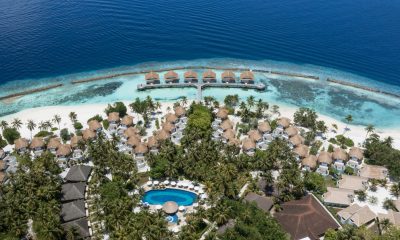
 Awards1 week ago
Awards1 week agoBandos Maldives earns Booking.com Traveller Review Award 2026
-
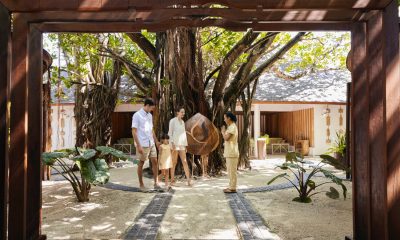
 Featured1 week ago
Featured1 week agoAncient banyan tree anchors spiritual experiences at Machchafushi Island Resort
-
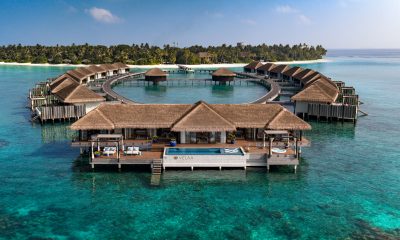
 News1 week ago
News1 week agoRefined overwater vision: Velaa Private Island’s upgraded Ocean Pool House
-
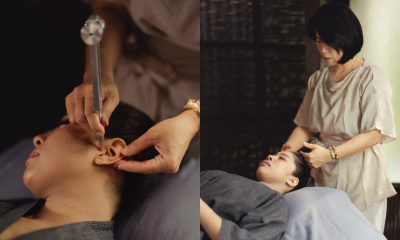
 Featured1 week ago
Featured1 week agoYoko Kawaguchi to lead holistic wellness residency at Vakkaru Maldives
-

 Cooking6 days ago
Cooking6 days agoA spring of flavours: Nowruz dining series at JW Marriott Maldives Resort & Spa
-

 Love1 week ago
Love1 week agoFushifaru Maldives combines romance and lunar new year traditions in guest programme
-

 News4 days ago
News4 days agoPulse Hotels & Resorts unveils Aura Maldives, a mindful luxury sanctuary








